- Home
- Cynthia Voigt
Dicey's Song Page 6
Dicey's Song Read online
Page 6
Dicey nodded and kept her face expressionless. “Then you do want me to stay on,” she said.
“Stay on? Here? Of course,” Millie said, “what made you think I didn’t? I can’t handle all this business alone.”
“I was just making sure,” Dicey said quickly.
Dicey rode home to Gram’s house these October days through sunlight turning golden and red, stopped by the mailbox (wondering each time why Gram had said nothing to the little kids about that letter from the doctor in Boston) and put in a quick half-hour’s work on the boat. She had accepted the slowness with which she was going to make progress. She kept herself from being impatient, just as she kept herself private at school.
After supper these days, and before she dashed through her own homework, she read with Maybeth for a half hour or so, the two of them at the kitchen table. Maybeth had lists of words she was supposed to memorize, vocabulary sheets. In the reading book, these words appeared in the stories. Mrs. Jackson had told Maybeth that if she stumbled on a word in a story, then she should go back and memorize the list again. So most of the time poor Maybeth was guessing her way through a list of twenty words, and Dicey would stop her when she made a mistake and Maybeth would go back to the top of the list and start again. Maybeth didn’t seem discouraged, but Dicey sure was.
She thought about Maybeth and Millie; and she didn’t want Maybeth to be like Millie when she grew up. It wasn’t that Dicey didn’t like Millie, because she did. It was all right, working for Millie. Dicey was learning a lot about how to run a grocery store, and she hoped that sometime Millie might show her how to butcher the sides of meat. But it wasn’t interesting, not like other people she had worked for, when she had conversations with them. She felt pretty sorry for Millie, so big and slow-witted. She wanted something better than Millie’s life for Maybeth.
Maybeth plugged along, reading, math, social studies. She never practiced her piano until everything else was done.
At the piano, at least, Maybeth moved fast. The scales had given way to rhythmic exercises and to real pieces, with chords. James, studying the music in one of the books Mr. Lingerle loaned Maybeth, said he couldn’t figure out how she could read the notes off onto the piano keys. Maybeth said it wasn’t hard. James said he thought it looked harder than reading words. Maybeth shook her head, no, and went back to the piece she was playing.
Gram took an old blouse of hers, with tiny flowers printed on it, and cut it down to make a dress for Maybeth to wear to the birthday party. It took her a week, every night, to finish it. It wasn’t a great dress, but Maybeth looked pretty in it. She was so excited, she whirled around the living room, letting the skirt swirl out.
James showed Dicey his report on the pilgrims. Dicey only read it because he wanted her to so badly, but once she’d started she found herself really interested. James had written about all the reasons why the Mayflower people wanted to come to America. He had found out who they all were and where they’d come from, and what had happened to them once they got to Plymouth. Dicey was surprised at what he was saying. Only some of the people came over for religious reasons, and even those (as James pointed out) hadn’t come because of a belief in religious freedom. They came over to practice their own religion, which was a very different thing from what Dicey had always heard. Some of the people came because they weren’t welcome in the society of England, because they were sort of rotten apples there. Some came because they had to, like wives, children, and indentured servants. Some came because they wanted to live and work in a land that civilization hadn’t already polished and divided, because they loved wildness, because they wanted to match themselves up against the wilderness and see how they did. Dicey could understand that feeling. Some of the settlers were looking for easy money, gold or furs, to get rich quick.
“It’s really good,” she said to James when she finished reading. He was standing anxiously behind her.
“You think so?”
“It’s interesting,” Dicey said. “I bet it’s the best report anybody does — I bet it’s miles better than any other report in your class. I’ll tell you,” she said, overwhelmed into honesty by the impression it made on her, “I don’t think I could write one this good.”
James tried not to look as pleased as he felt. “You think Gram would like to read it?” he asked.
At about that time, Mr. Chappelle assigned Dicey’s class a paper. He wanted them to write a character sketch, he said, about a real character they had met, someone they knew. He wanted them to show the conflict in a real person’s life. As soon as he said that, the complaints and questions began. Dicey stopped paying attention. She knew who she’d like to write about, she knew a whole lot of people. Momma, for one; but she couldn’t, because that wasn’t any of his business. Will Hawkins was another. She’d like writing about him. Not about the way he’d been a good friend to the children, taken them along with his circus and driven them down to Crisfield; and not even about what it was like to live with a circus, although that would be interesting. Dicey would write about the way Will was so honest with his friends, yet tricked the people who came to see his shows. Because the circus was like that, full of tricks that you didn’t know about until, like the four children, you had lived in it. Probably the people who came to see the shows didn’t care, but it wasn’t what the people wanted that interested Dicey. She wanted to write about those two opposite sides of Will. Maybe, if she wrote about him, she could figure out how he fit those two sides together in his life; maybe he did it by keeping them entirely separate, his friends and his work. She thought about him, traveling now around the country with his circus. He’d promised to come see them when the circus came back to the area, and she believed he would.
And there was Cousin Eunice, back in Bridgeport. In Dicey’s opinion, Cousin Eunice was a boring person, but she had conflicts too. She too had taken the children in. But she had only done it because she wanted people to think she’d done the right thing. What she really wanted to do was live the life she’d planned for herself before the Tillermans turned up. She didn’t want the children, they were nothing but trouble to her, trouble and expense; but she’d made herself change all her plans.
Dicey might just write something as good as James, she thought, the ideas tumbling around in her head. Then she corrected herself: almost as good as James. James was just too smart for her to keep up with.
Maybe she could write about Momma. If she called her Mrs. Liza, then Mr. Chappelle wouldn’t ever guess who she really was. If she just didn’t say certain things.
After class, Mina waited for Dicey by the door. “This essay might be fun,” Mina said. “I’ve got an idea.”
Dicey didn’t know why Mina wanted to talk to her. They hurried on through the crowded halls to home ec.
“I’d like to talk to you about it,” Mina said.
“Sure,” Dicey said. She usually liked Mina’s ideas.
“How about after school?”
“Can’t,” Dicey said. Mina waited for her to say more, but Dicey didn’t. She wasn’t sure why she didn’t, except that the more anybody knew about her . . . they had a kind of hold on her. She wasn’t sure, anyway, how Mina would feel about Dicey having a job, if Mina would feel sorry for her.
“You want to come by my house?” Mina asked.
“Can’t,” Dicey said.
Mina looked at her and Dicey looked right back. Contradictory expressions were on Mina’s face, a little confusion and some anger and some laughter. Mina chose to laugh. “You sure are a hard person to be friends with, Dicey Tillerman.”
Was that what Mina was doing? Dicey was so surprised, because Mina had lots of friends already, she didn’t even answer. They entered the horrible home ec. class, where they were supposed to be making work aprons, using everything they had learned about cutting and sewing, hems and buttons. Dicey had figured out a way to avoid most of the button troubles, a pretty clever way, she thought. The rules were you had to have two buttons on it and a
hem and a tie around the neck. Dicey was following the rules, but in her own way.
It had gotten so she could almost count on seeing Jeff after school, over by the bike racks. He’d call out to her, “Hey, Dicey.”
She would saunter over. “You ever hear this one?” he’d ask, and play her a song. Some of them, a lot of them, she already knew. Once, because it was in her mind for some reason, she asked him to play one of Momma’s favorites, “The water is wide, I cannot go o’er.” He didn’t know it, said he’d never heard it, but a couple of days later he had it ready for her.
Usually, Dicey would stay and sing with him, because she liked singing. A couple of times, he asked her about her sister who could sing so well, but Dicey never told him much. She thought, though, Maybeth would like Jeff. He was in tenth grade, he said, and he reminded Dicey that she was in eighth. “I know that,” Dicey answered. “So do I,” he said, peering up at her from where he sat bent over his guitar. The conversation was stupid, but she smiled. He smiled back, but she had to get to work so she didn’t bother finding out whether he thought it was stupid too.
One day, when Dicey came up to the back porch under a gray sky, her hands and shorts flecked with some of the paint she had scraped, she heard the piano playing a rolling, rippling melody, one that you couldn’t ever sing along with. There were no words that could keep up with the notes that swept from bass up through tenor to soprano. The piano was the only voice that could manage to sing that song. She stopped and listened, dumbfounded. How had Maybeth gotten so very good all at once?
She stepped into the kitchen and saw Maybeth sitting down at the table with Gram. Their heads were bent down over a reading book. Beside them was one of the word lists Mrs. Jackson never ran out of. Maybeth read aloud, word by stumbling word. You could hear her guessing. Dicey followed the music down the hall.
A man sat at the piano. He was so fat that his fanny hung down over the back of the bench. He was fat like a cartoon fat person. For a minute, Dicey saw nothing but fatness, then looked at the details. The back of his head had a bald spot, a pink circle with a few stray hairs carefully combed over it, as if he were trying to hide it. Like trying to hide a basketball under three shoelaces, Dicey thought. His eyes and nose and mouth were all buried in the flesh of his face, and his double chins hung down. His hands, despite looking thick and clumsy at the ends of huge arms, danced over the piano keys. He was concentrating so hard — adjusting his position on the bench as the chords took him up and down the keyboard, staring down at the keys under his fingers — that sweat ran down by his ear and his shirt was stained under the armpits. His mouth was open as if he was panting. And the music poured out of the piano like a stream pouring down the side of a mountain, or like the wind pouring over the bending branches of trees.
Dicey stood, listening.
After a while, the music ended. He sat in the silence, smiling to himself. He pushed his glasses back up his nose. Then he seemed to sense Dicey, silent in the doorway. He turned and looked at her.
“Who are you?” Dicey asked. “Are you the music teacher?”
“Isaac Lingerle,” he said. He watched her watching him. “You must be Dicey.”
“I didn’t see any car,” Dicey said.
“It’s parked out front, under a big tree.”
“What are you doing here?”
“I brought Maybeth home, and I want to ask your grandmother a question. But she said first Maybeth had to do some reading. That couldn’t wait, she said. Your grandmother’s not the woman to argue with.”
At that, Dicey smiled. He smiled back at her.
“Maybeth has to work awfully hard,” Dicey explained. “It’s important for her.”
“What about you, do you have to work hard?”
“Not at school,” Dicey told him. “They’ll be through pretty soon. I’ve gotta wash my hands to help get supper.”
He turned back to the piano. His hands, poised above the keys, as if he was thinking about what to play. He was as massive as a mountain, Dicey thought. Or at least a big hill.
She was coming back downstairs, having dusted off her shorts and her shirt as well as washed her hands, when she met Gram. The woman went into the living room and waited for the music to break off.
Mr. Lingerle turned to face her and stood up. “Beethoven,” he said, as if she’d asked him something.
“You’re not married,” Gram told him.
He looked puzzled, then his face turned a little pink. “As you see,” he said.
“Then you’ll stay for supper,” Gram told him.
Dicey almost protested: they would never have enough food to fill that huge body.
“I don’t know,” he said. He looked uneasy, as if he didn’t trust Gram.
“I’ve got no time to talk now, but after supper while Dicey does the dishes,” Gram told him. She turned and left the room.
Dicey was laughing inside her head at the effect Gram always had on people. Mr. Lingerle stood looking at the place where Gram’s bare feet had stood.
“How’d she know I wasn’t married?” he demanded.
“She was asking you,” Dicey said.
“That was a question?” He shook his head. “What a family,” he remarked.
Dicey closed her mouth over her response and left him alone there.
They had crabs for dinner and baked potatoes. Gram told the boys to empty every crab they had into the bushel basket, and by the size of the mound of cooked crabs on the center of the table, Dicey could tell that Gram shared her estimate of Mr. Lingerle’s appetite. James looked at their guest once, and then kept his eyes off him. Sammy tried not to stare and didn’t succeed. Maybeth, looking tiny next to him, kept up a kind of chatter about school. Sometimes, if Mr. Lingerle asked him a direct question, Sammy talked too. Mr. Lingerle seemed to know Sammy. Mr. Lingerle ate only four crabs after all, just like Dicey, and he picked out the littlest potato when the plate came to him, and he had only a couple of slices of tomato.
Finally, Sammy couldn’t keep his mouth shut any longer. “You don’t eat very much,” he accused the guest.
Mr. Lingerle flushed again. Dicey wondered about this, because he was entirely grown up and not even that young any more, not even a young grown-up. He took a deep breath and answered Sammy, and all the rest of them. “Let’s just acknowledge that I’m fat.”
“Nobody said anything,” Gram snapped.
Mr. Lingerle drew back. “I just think it’s better to say,” he apologized.
“Well, you’re right,” she snapped. “On both counts.”
Dicey giggled. She thought her grandmother was pretty funny sometimes. Dicey enjoyed her grandmother, and the way her grandmother’s mind worked. Mr. Lingerle gave Dicey a curious look, then he gave Gram a curious look, and his eyes became less wary. “You Tillermans certainly take some getting used to,” he remarked. “Maybeth has been surprise enough. I’m a simple man,” he said, with a smile that creased the flesh around his mouth. “I’m planning to relax and enjoy myself, unless you object?”
“We want you to,” Maybeth told him.
“Did you eat enough?” Sammy asked.
James tried to shush him, without success.
“Frankly, no. But here’s what I’ll do. When I get home, I’ll stuff myself with something. I’m always nervous, the first time people meet me, and I’m never hungry when I’m nervous. Does that answer your question?”
“You count your blessings, young man,” Gram said to Sammy; but her eyes were twinkling.
“Yes, Gram,” he answered. “Next time I won’t say anything.”
“Good.” Then Gram sent the little kids into the living room to do their homework. Dicey rolled up the crab shells in newspaper, washed and dried the dishes and glassware. She heard Mr. Lingerle ask Gram if Maybeth couldn’t have two lessons a week instead of one. She heard Gram say no.
“Listen to me for a minute,” Mr. Lingerle pleaded. “I’m not saying Maybeth is a genius, or anything like it.
But she is one of those people, one of those lucky people, who will always have music in their lives. People who can always find pleasure in music, no matter what else — hurts them, or goes wrong. I’d like to give her as much music as I can, because — because I want to. It’s a pleasure for me. And then” — his chair creaked as he leaned forward — “when I hear what the other teachers say about her — and when I see how hard she works — at the piano she has success. Don’t you want her to be successful, somewhere?”
“Of course, we do,” Gram snapped. Dicey, polishing plates dry, knew what was bothering Gram. Money. But Gram wasn’t going to admit that. Dicey admired her pride, but she thought Gram was wrong not to tell Mr. Lingerle.
“I know what you’re thinking, girl,” Gram said. Dicey came to stand beside her.
“I’m right,” Dicey said.
“You always think you’re right,” Gram said.
Dicey just went back to the sink. She could have been finished five minutes ago, but she wanted to listen in.
Gram was silent, then said, “We don’t have the money.”
“I wasn’t asking for money,” Mr. Lingerle cried, exasperated. “Did I mention money?”
Dicey turned around to catch the end of Gram’s quick smile. “If you can afford it,” Gram said.
“I can’t afford not to,” Mr. Lingerle told her. “I guess you can’t know — how exhilarating it is to teach someone like Maybeth. So, we’re agreed?”
“Entirely,” Gram said.
Before he left, Mr. Lingerle played them all a couple of pieces on the piano. Then he asked them to sing for him, because Maybeth had told him they liked to sing, so they sang “Amazing Grace.” Mr. Lingerle joined in with a rich bass harmony. Gram asked them to sing “Who Will Sing for Me,” and they did. Then Sammy wanted to sing “The Old Lady Who Swallowed a Fly.” When they had sung themselves out, Mr. Lingerle thanked them for a pleasant evening and left, getting himself, somehow, into a little Volkswagen that jounced off down the driveway, following its thin beams of light. They turned back to homework.

 The Runner
The Runner By Any Name
By Any Name Bad Girls, Bad Girls, Whatcha Gonna Do?
Bad Girls, Bad Girls, Whatcha Gonna Do?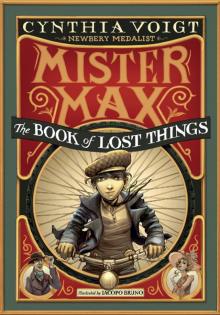 Mister Max: The Book of Lost Things: Mister Max 1
Mister Max: The Book of Lost Things: Mister Max 1 The Wings of a Falcon
The Wings of a Falcon Bad Girls in Love
Bad Girls in Love Toaff's Way
Toaff's Way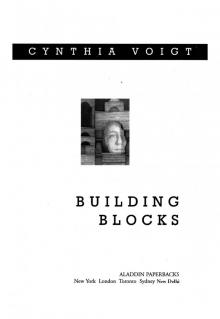 Building Blocks
Building Blocks Orfe
Orfe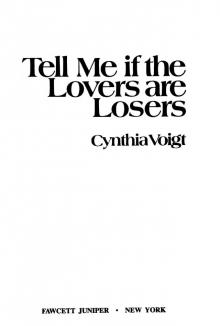 Tell Me if the Lovers Are Losers
Tell Me if the Lovers Are Losers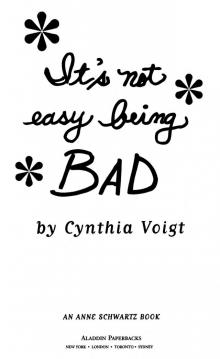 It's Not Easy Being Bad
It's Not Easy Being Bad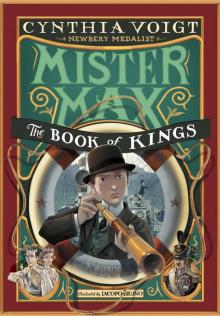 The Book of Kings
The Book of Kings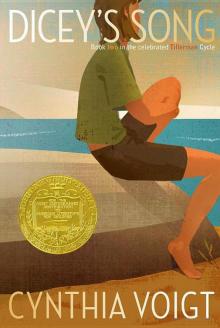 Dicey's Song
Dicey's Song A Solitary Blue
A Solitary Blue Tree by Leaf
Tree by Leaf Sons From Afar
Sons From Afar Teddy & Co.
Teddy & Co. Jackaroo
Jackaroo Elske
Elske Izzy, Willy-Nilly
Izzy, Willy-Nilly Come a Stranger
Come a Stranger Mister Max: The Book of Secrets: Mister Max 2
Mister Max: The Book of Secrets: Mister Max 2 Seventeen Against the Dealer
Seventeen Against the Dealer The Callender Papers
The Callender Papers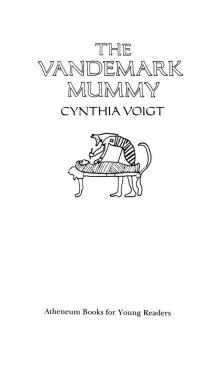 The Vandemark Mummy
The Vandemark Mummy Tale of Birle
Tale of Birle Glass Mountain
Glass Mountain The Tale of Oriel
The Tale of Oriel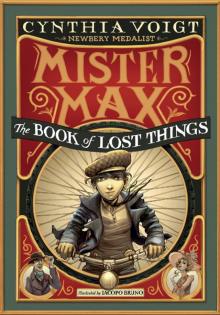 The Book of Lost Things
The Book of Lost Things The Book of Secrets
The Book of Secrets Tale of Gwyn
Tale of Gwyn